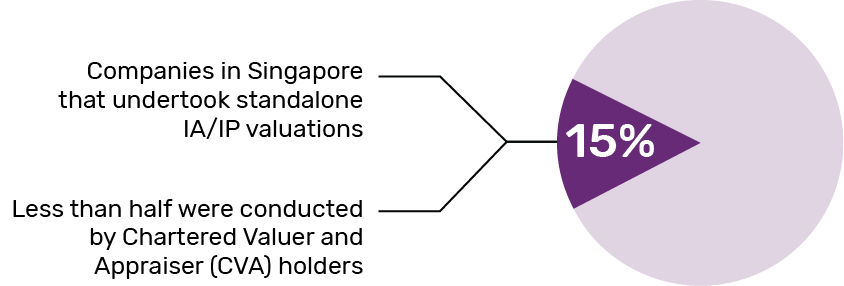Singapore IP Survey 2023
The Singapore IP Survey is a biennial survey about companies’ perceptions and usage of intangible assets and intellectual property (IA/IP).
On this page
The biennial Singapore IP Survey was conducted to better understand companies’ perception and usage of intangible assets and intellectual property (IA/IP).
The 2023 Singapore IP Survey was conducted from February to March 2023, with over 500 responses by companies from various sectors.
Key findings

*Correction issued on 27 Dec 2023: The datapoint “59% of companies are willing to pay a wage premium for employees with IP skills” was corrected from ”90% of companies are willing to give a wage premium of 26% or more for employees with IP skills”.
Business
1. Companies value IP
(a) Most important IP types
Around one in three companies indicated that the following are important areas for them:strong brand;
new technology and or process; and
confidential information.

(b) Business value of IP
15% of companies perceive that the bulk of their value resides in IA/IP.

(c) How companies are using their IA/IP
Recognising the importance of IA/IP, companies felt that IA/IP helped enhance their company performance in the following areas:Provide new opportunities for collaboration with other businesses
Increase business competitiveness
Facilitate market expansion or internationalisation
Increase revenue

Did you know that you can gain revenue from IP and IA?
Learn more about how IP and IA can boost company growth:
2. Support & resources for companies
While companies recognise the importance of IA/IP, there is a need to raise awareness of IP-related services and build IP knowledge.
4 out of 5 companies would like more opportunities to use IA/IP to obtain financing.

92% of companies did not make use of any form of government subsidies or grants for their IP activities, with more than half citing a lack of awareness as the key factor.
For those who were granted government subsidies, half were obtained from the Enterprise Development Grant (EDG), and the others acquired the Market Readiness Assistance (MRA) Grant.

IP resources for businesses:
Intangibles Disclosure Framework: Use this framework to better disclose and communicate your enterprise's IA.
Grants & Schemes: Apply for the following grants &/or schemes for defraying IP costs
IP Clinics: Consult business experts and lawyers on IP strategies and dispute matters
GoBusiness IP Grow: Understand IA/IP needs for your business and get tailored recommendations for IA/IP service providers
Jobs
1. Employees with IP skills are valued
Around 1 in 2 companies consider IP skills as a competitive edge when hiring employees, and 59% of companies are willing to give a wage premium for employees with IP skills.


Did you know that IP skills are an asset in the workplace?
IP Academy: Singapore’s only dedicated centre for IP education and training to develop your team's IP capabilities
Specialist Certificate in Intangible Asset Management: Obtain working knowledge of how IP drives business strategies
These are the top three job functions which require IP skills:

2. Valuation
15% of companies in Singapore undertook standalone valuation, of which less than half were conducted by Chartered Valuer and Appraiser (CVA) holders.

Get certified for the CVA programme to be recognised as a quality Business Valuation professional.
IP Hub
1. Global IA/IP hub
1 in 3 companies seek to expand into/have a presence in other ASEAN countries. However, more than 60% of companies face significant IP-related challenges.

Speed up your IP protection process when going global with our international and regional acceleration programmes.
The top 3 IP-related challenges companies face when seeking to expand into/have a presence in other ASEAN countries are:

2. Singapore as an IP Dispute Resolution (IPDR) Hub
1 in 5 companies choose Singapore as a preferred venue for IP dispute resolution.

(a) Top factors for choice of IP dispute resolution location
Governing law of contract or agreement is important for more than 50% of companies when deciding where to resolve the company IP dispute. This is followed by ease of enforcement (36%) and the speed of dispute resolution process in the jurisdiction (36%).

Tap on these programmes and initiatives to defray mediation costs for IP disputes:
Tap on these grants to help you fund your IP activities:
IA account for more than 90% of business value (Ocean Tomo, Intangible Asset Market Value study, 2020). Drive business growth by managing your IA/IP with us!
You may also wish to see the findings from the Singapore IP Survey 2021.
